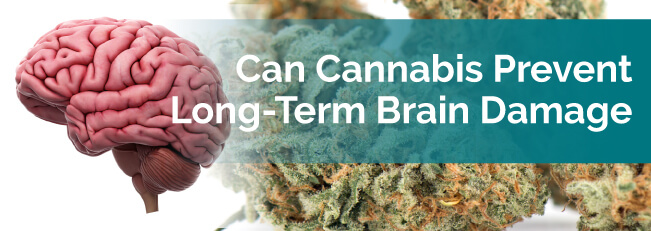
When an injury occurs to the brain, the initial trauma isn’t the only danger. Traumatic brain injury (TBI) is often accompanied by secondary damage that occurs after the initial hit, which can be more destructive. There are several causes for this, but the result is usually long-term brain damage.
TBI can cause devastating repercussions to a person’s life, and the statistics surrounding traumatic brain injuries are astounding. Every year, more than 50,000 people die and around 80,000 people are injured due to complications associated with a TBI. In fact, more than 5 million people living in the U.S. today live with TBI-related disabilities.
What makes these numbers so devastating is that there is currently no drug used for the effective treatment of traumatic brain injuries. Doctors treat the initial damage, then offer different forms of therapy to help the person deal with any brain damage that occurs.
Medical marijuana may be the answer to the secondary damage that occurs after a TBI. Research studies show it contains valuable properties that can decrease the risk of brain damage occurring.
When a traumatic brain injury happens, some external force acts on the brain, which causes damage. This can be isolated at the point of impact, or could cause damage throughout if the injury has made the brain move inside the skull. TBI can be mild, moderate or severe. However, even if a TBI appears mild, secondary brain damage can occur.
Brain damage is caused by the brain being deprived of oxygen. Although this can be caused by the initial shock from a TBI, often secondary damage increases the risk of permanent brain impairment. Types of secondary damage include:
Although cannabis can’t prevent the initial cause of a TBI, it can help with some of the secondary damage that occurs after the injury. A study out of Tel Aviv University shows administering the marijuana cannabinoid THC shortly before or after a TBI occurs could prevent long-term brain damage.
The reason THC is so effective is that this cannabinoid binds to neural receptors by mimicking our body’s own endocannabinoid receptors. This allows it to interact with our body’s chemistry in interesting and beneficial ways.
As it relates to a traumatic brain injury, marijuana has three significant benefits:
Although these findings are still in their research phase, patients with traumatic brain injuries could be seeing the benefits of cannabis medications very soon.
Every medical condition is unique, which is why our information shouldn’t replace that of a qualified professional. If you have specific questions or concerns, contact a doctor or budtender. Search our database of medical marijuana-certified doctors or find a dispensary near you.
For more information about how cannabis can be used to treat Traumatic Brain Injury, check out our resources: